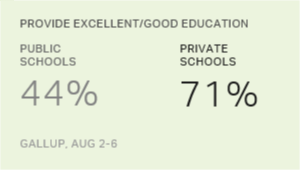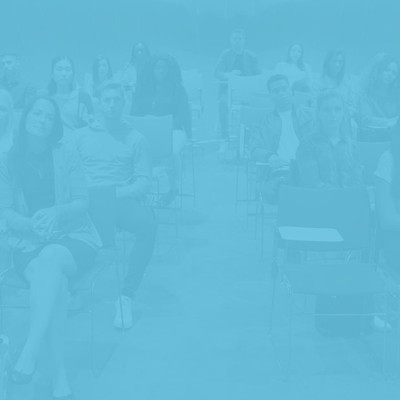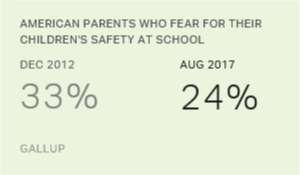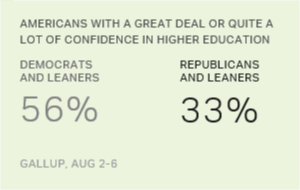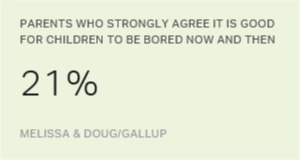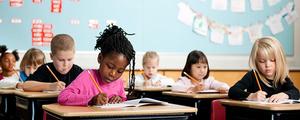Story Highlights
- Seven in 10 U.S. adults say private schools do excellent/good job
- Far exceeds 44% rating for public schools
- GOP more positive about public schools; Democrats sour on charters
WASHINGTON, D.C. -- As another school year begins, Americans believe private schools provide students with the best K-12 education of five different types of schools in the U.S. The 71% who rate the quality of private school education as excellent or good exceeds the ratings for parochial, charter, home and public schooling, in that order.
| Excellent | Good | Only fair | Poor | Excellent/Good | |||||||||||||||||||||||||||||||||||||||||||||||||||||||||||||||||||||||||||||||||||||||||||||||
|---|---|---|---|---|---|---|---|---|---|---|---|---|---|---|---|---|---|---|---|---|---|---|---|---|---|---|---|---|---|---|---|---|---|---|---|---|---|---|---|---|---|---|---|---|---|---|---|---|---|---|---|---|---|---|---|---|---|---|---|---|---|---|---|---|---|---|---|---|---|---|---|---|---|---|---|---|---|---|---|---|---|---|---|---|---|---|---|---|---|---|---|---|---|---|---|---|---|---|---|
| % | % | % | % | % | |||||||||||||||||||||||||||||||||||||||||||||||||||||||||||||||||||||||||||||||||||||||||||||||
| Independent private schools | 21 | 50 | 17 | 4 | 71 | ||||||||||||||||||||||||||||||||||||||||||||||||||||||||||||||||||||||||||||||||||||||||||||||
| Parochial or church-related schools | 21 | 42 | 21 | 9 | 63 | ||||||||||||||||||||||||||||||||||||||||||||||||||||||||||||||||||||||||||||||||||||||||||||||
| Charter schools | 14 | 41 | 23 | 9 | 55 | ||||||||||||||||||||||||||||||||||||||||||||||||||||||||||||||||||||||||||||||||||||||||||||||
| Home schooling | 14 | 32 | 31 | 15 | 46 | ||||||||||||||||||||||||||||||||||||||||||||||||||||||||||||||||||||||||||||||||||||||||||||||
| Public schools | 5 | 39 | 35 | 19 | 44 | ||||||||||||||||||||||||||||||||||||||||||||||||||||||||||||||||||||||||||||||||||||||||||||||
| Gallup, Aug. 2-6, 2017 | |||||||||||||||||||||||||||||||||||||||||||||||||||||||||||||||||||||||||||||||||||||||||||||||||||
The 71% of Americans who rate private school education positively is only a bit higher than the 63% positive rating for parochial schools but far outpaces the percentages for charter schools (55%), home schooling (46%) and public schools (44%).
Both Party Groups Rate Private Schools Best
The views of parents with children in K-12 about the quality of the various educational options are largely similar to those of adults without school-aged children.
There are greater differences by party identification. Republicans are more positive than Democrats about parochial, charter and home schooling, and Democrats are more positive than Republicans about public schooling.
Still, both party groups rank private schooling as the most effective, with 76% of Republicans and 68% of Democrats saying it provides students with an excellent or good education. Parochial schools rank second for both. However, charter schools rank third among Republicans, followed by home schooling and then public schools. For Democrats, charter schools tie with public schools at 48%, while home schooling is rated worst at 38%.
| Republican/Lean Republican | Democrat/Lean Democratic | Difference | |||||||||||||||||||||||||||||||||||||||||||||||||||||||||||||||||||||||||||||||||||||||||||||||||
|---|---|---|---|---|---|---|---|---|---|---|---|---|---|---|---|---|---|---|---|---|---|---|---|---|---|---|---|---|---|---|---|---|---|---|---|---|---|---|---|---|---|---|---|---|---|---|---|---|---|---|---|---|---|---|---|---|---|---|---|---|---|---|---|---|---|---|---|---|---|---|---|---|---|---|---|---|---|---|---|---|---|---|---|---|---|---|---|---|---|---|---|---|---|---|---|---|---|---|---|
| % | % | pct. pts. | |||||||||||||||||||||||||||||||||||||||||||||||||||||||||||||||||||||||||||||||||||||||||||||||||
| Independent private schools | 76 | 68 | 8 | ||||||||||||||||||||||||||||||||||||||||||||||||||||||||||||||||||||||||||||||||||||||||||||||||
| Parochial or church-related schools | 71 | 56 | 15 | ||||||||||||||||||||||||||||||||||||||||||||||||||||||||||||||||||||||||||||||||||||||||||||||||
| Charter schools | 62 | 48 | 14 | ||||||||||||||||||||||||||||||||||||||||||||||||||||||||||||||||||||||||||||||||||||||||||||||||
| Home schooling | 55 | 38 | 17 | ||||||||||||||||||||||||||||||||||||||||||||||||||||||||||||||||||||||||||||||||||||||||||||||||
| Public schools | 39 | 48 | 9 | ||||||||||||||||||||||||||||||||||||||||||||||||||||||||||||||||||||||||||||||||||||||||||||||||
| Gallup, Aug. 2-6, 2017 | |||||||||||||||||||||||||||||||||||||||||||||||||||||||||||||||||||||||||||||||||||||||||||||||||||
Private School Image Slips Slightly, Public Up Slightly
This year's overall rank order is the same as what Gallup found in its only prior measurement, in August 2012. However, since then, the percentage of U.S. adults who consider public school education as excellent or good increased by seven percentage points, while positive perceptions of private school education fell by the same amount.
Positive ratings of parochial education are also down slightly, by six points, while the ratings for charter schools and home schooling are statistically unchanged.
| August 2012 | August 2017 | Change | |||||||||||||||||||||||||||||||||||||||||||||||||||||||||||||||||||||||||||||||||||||||||||||||||
|---|---|---|---|---|---|---|---|---|---|---|---|---|---|---|---|---|---|---|---|---|---|---|---|---|---|---|---|---|---|---|---|---|---|---|---|---|---|---|---|---|---|---|---|---|---|---|---|---|---|---|---|---|---|---|---|---|---|---|---|---|---|---|---|---|---|---|---|---|---|---|---|---|---|---|---|---|---|---|---|---|---|---|---|---|---|---|---|---|---|---|---|---|---|---|---|---|---|---|---|
| % | % | pct. pts. | |||||||||||||||||||||||||||||||||||||||||||||||||||||||||||||||||||||||||||||||||||||||||||||||||
| Public schools | 37 | 44 | +7 | ||||||||||||||||||||||||||||||||||||||||||||||||||||||||||||||||||||||||||||||||||||||||||||||||
| Independent private schools | 78 | 71 | -7 | ||||||||||||||||||||||||||||||||||||||||||||||||||||||||||||||||||||||||||||||||||||||||||||||||
| Parochial or church-related schools | 69 | 63 | -6 | ||||||||||||||||||||||||||||||||||||||||||||||||||||||||||||||||||||||||||||||||||||||||||||||||
| Charter schools | 60 | 55 | -5 | ||||||||||||||||||||||||||||||||||||||||||||||||||||||||||||||||||||||||||||||||||||||||||||||||
| Home schooling | 46 | 46 | 0 | ||||||||||||||||||||||||||||||||||||||||||||||||||||||||||||||||||||||||||||||||||||||||||||||||
| Gallup | |||||||||||||||||||||||||||||||||||||||||||||||||||||||||||||||||||||||||||||||||||||||||||||||||||
Since 2012, public schools' reputation has improved mainly among Republicans, whose excellent/good reviews have risen nine points to 39%. Public schools have improved only slightly among Democrats. At the same time, parochial and private schools' ratings are either down or unchanged among both groups.
The parties diverge on charter schools. While the percentage of Republicans considering these types of schools as excellent or good has held steady at 62%, Democrats' reviews have fallen from 61% positive in 2012 to 48% today, perhaps as charter schooling is becoming more closely tied to Donald Trump's administration. His secretary of education, Betsy DeVos, is a longtime proponent of charter schools as a way to give parents alternatives to public schools.
| 2012 | 2017 | Change | ||||||||||||||||||||||||||||||||||||||||||||||||||||||||||||||||||||||||||||||||||||||||||||||||||
|---|---|---|---|---|---|---|---|---|---|---|---|---|---|---|---|---|---|---|---|---|---|---|---|---|---|---|---|---|---|---|---|---|---|---|---|---|---|---|---|---|---|---|---|---|---|---|---|---|---|---|---|---|---|---|---|---|---|---|---|---|---|---|---|---|---|---|---|---|---|---|---|---|---|---|---|---|---|---|---|---|---|---|---|---|---|---|---|---|---|---|---|---|---|---|---|---|---|---|---|---|
| % | % | pct. pts. | ||||||||||||||||||||||||||||||||||||||||||||||||||||||||||||||||||||||||||||||||||||||||||||||||||
| Republican/Lean Republican | ||||||||||||||||||||||||||||||||||||||||||||||||||||||||||||||||||||||||||||||||||||||||||||||||||||
| Independent private schools | 83 | 76 | -7 | |||||||||||||||||||||||||||||||||||||||||||||||||||||||||||||||||||||||||||||||||||||||||||||||||
| Parochial or church-related schools | 76 | 71 | -5 | |||||||||||||||||||||||||||||||||||||||||||||||||||||||||||||||||||||||||||||||||||||||||||||||||
| Charter schools | 62 | 62 | 0 | |||||||||||||||||||||||||||||||||||||||||||||||||||||||||||||||||||||||||||||||||||||||||||||||||
| Home schooling | 55 | 55 | 0 | |||||||||||||||||||||||||||||||||||||||||||||||||||||||||||||||||||||||||||||||||||||||||||||||||
| Public schools | 30 | 39 | +9 | |||||||||||||||||||||||||||||||||||||||||||||||||||||||||||||||||||||||||||||||||||||||||||||||||
| Democrat/Lean Democratic | ||||||||||||||||||||||||||||||||||||||||||||||||||||||||||||||||||||||||||||||||||||||||||||||||||||
| Independent private schools | 74 | 68 | -6 | |||||||||||||||||||||||||||||||||||||||||||||||||||||||||||||||||||||||||||||||||||||||||||||||||
| Parochial or church-related schools | 67 | 56 | -11 | |||||||||||||||||||||||||||||||||||||||||||||||||||||||||||||||||||||||||||||||||||||||||||||||||
| Charter schools | 61 | 48 | -13 | |||||||||||||||||||||||||||||||||||||||||||||||||||||||||||||||||||||||||||||||||||||||||||||||||
| Home schooling | 41 | 38 | -3 | |||||||||||||||||||||||||||||||||||||||||||||||||||||||||||||||||||||||||||||||||||||||||||||||||
| Public schools | 44 | 48 | +4 | |||||||||||||||||||||||||||||||||||||||||||||||||||||||||||||||||||||||||||||||||||||||||||||||||
| Gallup | ||||||||||||||||||||||||||||||||||||||||||||||||||||||||||||||||||||||||||||||||||||||||||||||||||||
Implications
Americans as a whole believe private and parochial schools do a better job of educating students than public schools do, something that might be remedied with the right federal or state public school education policies. Another remedy may be expanding charter schools so that parents of children in failing public schools who can't afford private school have other options for their children.
DeVos recently told a charter schools conference, "No one has a monopoly on innovation. No one has a monopoly on creativity. No one has a monopoly on knowing how every child learns." That reflects a very different philosophy of education than the philosophy that government money should be focused on lifting public schools to their maximum potential.
The charter schools solution has also proved controversial. Recent studies have cast doubt on the value of charter schools in DeVos' home state of Michigan, but an earlier study by Brookings found urban charter schools across the country succeeding even as suburban ones have not. Regardless, Democrats have grown less positive about the quality of education provided by charter schools than they were five years ago, even as Republicans continue to stand by the sector.
Meanwhile, the states are transitioning away from policies established under No Child Left Behind (NCLB) and toward the new standards of the Every Student Succeeds Act. ESSA standards are supposed to give states more flexibility in monitoring student and school performance.
It is clearly a time of transition in education policy, with multiple efforts underway. These efforts have the potential to improve public schools, and therefore Americans' confidence in them.
Historical data are available in Gallup Analytics.

Optimize Your School
Engage students to help them get the most out of their education.
Survey Methods
Results for this Gallup poll are based on telephone interviews conducted Aug. 2-6, 2017, with a random sample of 1,017 adults, aged 18 and older, living in all 50 U.S. states and the District of Columbia. For results based on the total sample of national adults, the margin of sampling error is ±4 percentage points at the 95% confidence level. For results based on the 233 parents of school-aged children, the margin of sampling error is ±8 percentage points at the 95% confidence level. All reported margins of sampling error include computed design effects for weighting.
Each sample of national adults includes a minimum quota of 70% cellphone respondents and 30% landline respondents, with additional minimum quotas by time zone within region. Landline and cellular telephone numbers are selected using random-digit-dial methods.
View survey methodology, complete question responses and trends.
Learn more about how the Gallup Poll Social Series works.
